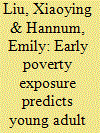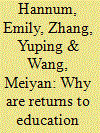|
|
|
Sort Order |
|
|
|
Items / Page
|
|
|
|
|
|
|
| Srl | Item |
| 1 |
ID:
159048


|
|
|
|
|
| Summary/Abstract |
Comparative research suggests that poverty in childhood, and especially in the early years, impedes educational attainment. With longitudinal data from China, we estimate hazard models of dropping out of school in young adulthood with two dynamic measures of childhood poverty: poverty spell indicators that distinguish poverty in early childhood, middle childhood, and adolescence, and poverty indices that measure the depth of poverty and distinguish chronic from transient poverty.
Four main results emerge: 1) Children who experience spells in poverty leave school at a higher rate than others, even adjusting for poverty in later periods; 2) Transient poverty is more widespread, and shows a greater negative association with school-leaving, than chronic poverty; 3) Early childhood poverty shows greater negative associations with education outcomes than poverty in later periods; and 4) Girls may be more susceptible than boys to early poverty. We further test two possible mechanisms of impact: early nutrition poverty and school fees. While lower protein intake at an early stage of life is related to poorer educational outcomes in young adulthood, adjusting for nutritional deprivation does not attenuate the associations of early transient income poverty. Results do not suggest that cohorts that experienced school-fee abolishment policies experienced different poverty effects than other cohorts.
|
|
|
|
|
|
|
|
|
|
|
|
|
|
|
|
| 2 |
ID:
169110


|
|
|
|
|
| Summary/Abstract |
Few studies of childhood poverty in China have considered social deprivations, and fewer still have considered deprivations in contexts beyond the household. In this article, the authors propose a multi-context poverty measure that includes economic and social deprivations in the family, school, and community domains. The authors compare this measure to standard money-metric measures of poverty using a 15-year longitudinal study of children from 100 villages in Northwest China. Nearly a quarter of multi-context poor children are not income poor, while almost three-fourths of the income poor are not multi-context poor. Social and community deprivations are only weakly associated with ‘money-metric’ deprivations but are significantly linked with short and long-term welfare outcomes for children. The multi-context approach can be tailored to index household and community poverty alleviation targets.
|
|
|
|
|
|
|
|
|
|
|
|
|
|
|
|
| 3 |
ID:
124643


|
|
|
|
|
| Publication |
2013.
|
| Summary/Abstract |
It is well established that returns on education are higher for women than for men in urban China. We argue that this finding, while accurate, is misleading owing to its individualist perspective. The income to which most working-age women and men have access includes not only their own income, but also spouse income. Furthermore, decisions about participation and investment in the labour force, both consequential for income trajectories, are likely to be made with partner income and potential income in mind. To our knowledge, no research in China has explored the returns to education enjoyed via spouse income, or the implications of pooling couple income, for illuminating the returns to schooling difference for women and men. In this article, using data from the China Urban Labour Survey (2001), we argue that the returns for women, conventionally defined, are higher than for men because many women trade their own income for spouse income, and this is particularly true among less educated women. We demonstrate, first, that women who are more educated are less likely to get married, while the reverse is true for men. Second, we show that among couples there is evidence of a trade-off in investments in careers. Moreover, among couples, the less educated the woman and the more educated the man, the less likely the couple is to depend heavily on her income. Finally, we show that among couples there is a compensating reverse pattern of returns differences by sex when income is conceptualized as spouse income. Thus, in terms of total couple income, there are no returns differences by sex.
|
|
|
|
|
|
|
|
|
|
|
|
|
|
|
|
|
|
|
|
|